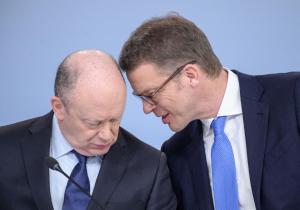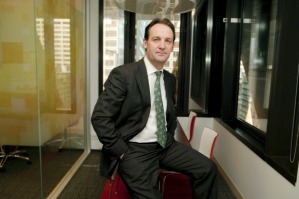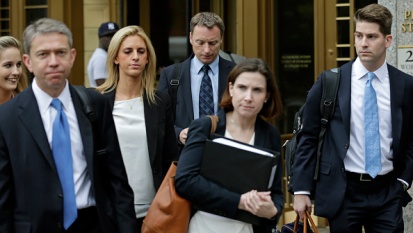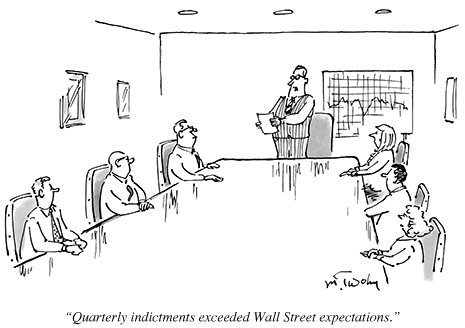Trump Acquisition, Corp, others, sue Deutsche Bank -intervention, injunction,lifted,appealed,stayed, expedited
31 May, 2019
_____________________________
ORDER
Docket No. 19-1540 The parties jointly move the Court to expedite this appeal. They propose that the appeal proceed as follows: Appellants’ opening brief and the appendix will be filed by June 18, 2019; Appellees’ response briefs will be filed by July 11, 2019; and Appellants’ reply brief will be filed by July 18, 2019. IT IS HEREBY ORDERED that the joint motion is GRANTED. The Clerk is directed to calendar argument in this matter for the earliest possible sitting week after briefing is completed.
[May 26 2019]
An agreement to stay enforcement of the subpoenas for Trump’s financial records between Trump’s attorneys, the banks and the House Intelligence and the Financial Services Committees was filed in U.S. District Court for the Southern District of New York following an appeal submitted on May 24 2019 by Trump and his affiliates against an existing order from a federal judge allowing the banks to hand over financial records to Democratic lawmakers.
[May 22 2019]
Trump, his adult children, Donald Jr., Eric and Ivanka, and the Trump Organization sought a preliminary injunction to prevent Deutsche Bank complying with the subpoenas from the House Financial Services Committee and the House Intelligence Committee, and Capital One from complying with a subpoena from the Financial Services Committee. U.S. District Judge Edgardo Ramos ruled at a court hearing in New York that Congress has the legal authority to demand the records, Ramos was appointed by President Obama.
[ May 4 2019 ]
Two committees of the Democrat-controlled U.S. House of Representatives on May 3 2019 asked to intervene in a lawsuit filed by President Donald Trump, his three oldest children and the Trump Organization seeking to block House subpoenas seeking financial records from Deutsche Bank AG and Capital One Financial Corp.
Trump’s lawsuit may slow down the congressional investigations but is unlikely to stop them in the long run, says Laurie Levenson, a professor at Loyola Law School.
“I think the president is fully aware that down the road, the court will allow some of these subpoenas, especially the ones that focus on him and his transactions,” she says.
[May 1 2019 ]
COMPLAINT against Deutsche Bank, AG, Capital One Financial Corp.. (Filing Fee $ 400.00, Receipt Number ANYSDC-16789203)Document filed by The Trump Organization, Inc., Trump Acquisition, Corp., Eric Trump, Trump Organization LLC, DJT Holdings Managing Member LLC, Donald J. Trump, Jr, DJT Holdings LLC, Donald J. Trump, Ivanka Trump, Trump Acquisition LLC, The Donald J. Trump Revocable Trust.(Strawbridge, Patrick)
New York Southern District Court
Case #: 1:19-cv-03826
Nature of Suit 890 Other Statutes – Other Statutory Actions
Cause 12:3410 Right to Financial Privacy: Customer Challenges
Case Filed: Apr 29, 2019
http://prod-upp-image-read.ft.com/9ee796f6-6af0-11e9-a9a5-351eeaef6d84
Attorneys for President Trump said in a court filing May 1 2019 that Deutsche Bank and Capital One have agreed not to produce any financial records requested under congressional subpoenas until after a federal judge rules on whether to issue a preliminary injunction in the case.
During an explosive public hearing in February, Cohen disclosed copies of Trump’s financial statements which he said were turned over to Deutsche Bank as Trump was seeking a loan to place a bid on an NFL team, the Buffalo Bills. Those statements, according to Cohen, contained false information.
The committee has requested similar records from Capital One, which asked for a “friendly” subpoena before it could comply.
On Capitol Hill, Republicans have rushed to Trump’s defense amid the onslaught of investigations and subpoenas, claiming Democrats are abusing their authority to take down the president and eventually impeach him.
[Febtuary 3 2019 Deutsche Bank: international, national security nexus? ]

‘At no time was any money needed to finance the purchase or the refurbishment of Trump Turnberry.’
Amanda Miller never explicitly addressed whether the Trump Organization asked Deutsche Bank for a loan.The bank declined to comment.
“The bank has received a request from the House Financial Services and Intelligence Committees,” said a spokesman for Deutsche Bank on January 24 2019 in Frankfurt. “The Bank is engaged in constructive dialogue with these committees to best assist them in their oversight functions. We will continue to provide the information we need during all official investigations. ”
“The interesting thing about Deutsche Bank is they seem to be pretty much the only entity out there willing to lend to The Trump Organization,” Rep. Jim Himes (D-Conn.), a member of both committees, said. For the Intelligence Committee, “there has to be some sort of international, national security nexus” such as Russian involvement.
[December 2 2018 money laundering via BVI? ]

DECEMBER 1, 2018 “It’s about two employees who, at the time, helped to work through everything surrounding the issue of the Panama Papers. Deutsche Bank (DBKGn.DE) is not at risk of a takeover, said Christian Sewing, its chief executive.
[November 29 2018]
Deutsche Bank confirmed that police had raided several locations in Germany. In 2016 alone, more than 900 customers were served by a Deutsche Bank subsidiary registered in the British Virgin Islands, generating a volume of €311m, the prosecutors allege.
The investigation was sparked by revelations in the 2016 “Panama Papers” – an enormous amount of information leaked from a Panamanian law firm called Mossack Fonseca.
Paul Manafort : to pay $3.2 million to settle federal charges
[ June 21 2018 “jamming the fix” at Deutsche Bank ]

John Cryan is out and Christian Sewing is in as CEO of Deutsche Bank
Certain Deutsche Bank traders involved accumulating a large trading position and then using the position to make aggressive trades just before and during the fix window, with the intention of moving the ultimate fix price in a desired direction, up or down – known as “jamming the fix.”
This technique involved accumulating a large trading position, and then using the position to make aggressive trades just before and during the fix window, with the intention of moving the ultimate fix price in a desired direction, up or down (known as“jamming the fix”). Certain Deutsche Bank traders boosted the potential impact of this strategy by using multi-bank chats to share sensitive and confidential client information. This allowed them to learn, for example, whether other traders had large positions in the opposite direction, so that they could attempt to coordinate trading strategies and achieve maximum influence on the published fix rate. The DFS investigation found that it appeared to be understood by other Deutsche Bank traders that the New York foreign exchange spot desk welcomed fix business, in part because of profits generated through manipulation. Deutsche Bank foreign exchange staff were also willing to assist customers who also sought to manipulate fix business. Deutsche Bank AG has agreed to pay a fine of $205 million as part of a consent order with the New York State Department of Financial Services (DFS) for violations of New York banking law, including efforts to improperly coordinate trading activity through online chat rooms, improperly sharing confidential customer information, trading aggressively to skew prices, and misleading customers. https://www.dfs.ny.gov/about/ea/ea180620.pdf
Traders at Deutsche Bank’s US unit suffered losses 12 times larger than its risk projections estimate could occur in one day. On 19 June, the day before news of the trading losses emerged, Deutsche bank let go of five emerging market traders.
[June 2 S&P downgrades Deutsche Bank, Aussie cartel charges filed ]

ANZ treasurer, Rick Moscati
Credit reporting agency Moody’s Investors Service says criminal cartel proceedings against the ANZ Bank are credit negative.
ANZ, its head of treasury, investment banks Citigroup and Deutsche Bank and several other individuals face criminal cartel charges. The ASIC [Australian Competition and Consumer Commission ] investigation centres on whether [Australia and New Zealand Banking Group Limited] ANZ’s announcement of August 7, 2015 should have stated the joint lead managers took up approximately 25.5 million shares of the placement.
The shortfall in finding buyers left the underwriters with around $790 million worth of unsold shares. An ANZ statement issued the day after the institutional share sale said the deal had been completed, but made no mention of stock retained by the underwriters and whether there were any plans to dispose of it.
On Thursday, May 31, rating agency S&P downgraded its view of Deutsche Bank’s financial stability, down from A- to BBB+. The agency attributed its decision on Germany’s largest lender to the fact that it believes the bank’s latest restructuring is riskier than had been expected.
That news came at the same time as Deutsche Bank’s US subsidiary was added to the US Federal Deposit Insurance Corporation’s list of “problem banks.”
Deutsche Bank’s shares fell hard on Thursday, May 31, down by 7.2 percent on Frankfurt’s DAX exchange, hitting their lowest ever level in the process. In early trade on Friday, Jume 1, they have recovered somewhat, up by around 1.7 percent.
[ 25 % cut in trading jobs at Deutsche Bank NYC & London ]

60 Wall Street
Deutsche Bank (DBKGn.DE) said global headcount would fall to well below 90,000 from 97,000, with a 25 percent cut in equities sales and trading jobs, which are mainly in New York and London and where it has been losing ground to U.S. rivals. It was aiming to axe 10,000 positions.
“We remain committed to our Corporate & Investment Bank and our international presence – we are unwavering in that,” said Christian Sewing, Chairman of the Management Board. €1,050 billion euros of leverage exposure, the ratio of assets to capital on the bank’s balance sheet, was reported at the end of the first quarter of 2018, including derivatives, securities financing transactions (SFTs).
[ Punishment in U.S. over Libor for Societe Generale ]

Didier Valet, right
France is no longer cooperating with U.S. information requests, a decision shaped in part by the monster fines levied on BNP Paribas SA for violating U.S. sanctions. Didier Valet, Societe Generale SA’s deputy CEO, has left without severance pay after a “divergence of approaches” at the bank on how to settle the Justice Department’s probe into whether traders manipulated benchmark interest rates. Is he leaving as a sacrificial offering to the authorities? If that’s the case, the punishment over Libor could be harsher for Societe Generale than for other big banks.
[ July 28 2017 Libor out; SONIA in? ]

Andrew Bailey, chief executive of the Financial Conduct Authority, says that work must “begin in earnest” on shifting to an alternative index to Libor, saying the end of 2021 would offer time to ensure a smooth transition.The BoE has already been refining its overnight sterling funding rate SONIA, which is based on actual transactions, and which the central bank administers itself, as the substitute for Libor. At least six bankers on both sides of the Atlantic have been sent to prison for manipulating Libor, although some in the United States are still awaiting sentencing.
[July 22 Deutsche Bank and JPMorgan Chase settle yen Libor and Euroyen Tibor cases; “London Whale”; charges dropped ]

U.S. prosecutors have decided to drop criminal charges against two former JPMorgan Chase & Co derivatives traders implicated in the “London Whale” trading scandal that caused $6.2 billion of losses in 2012.
In seeking the dismissal of charges against Javier Martin-Artajo and Julien Grout, the Department of Justice said it “no longer believes that it can rely on the testimony” of Bruno Iksil, a cooperating witness who had been dubbed the London Whale, based on recent statements he made that hurt the case.
Prosecutors also said efforts to extradite Martin-Artajo and Grout, respectively citizens of Spain and France, to face the charges have been “unsuccessful or deemed futile.”
Acting U.S. Attorney Joon Kim in Manhattan asked a federal judge for permission to drop charges that included securities fraud, wire fraud and falsifying records. Martin-Artajo and Grout were indicted in September 2013.
–
Deutsche Bank AG (DBKGn.DE) and JPMorgan Chase & Co (JPM.N) have agreed to pay a combined $148 million to end private U.S. antitrust litigation claiming they conspired with other banks to manipulate the yen Libor and Euroyen Tibor benchmark interest rates.
The preliminary settlements, totaling $77 million for Deutsche Bank and $71 million for JPMorgan, were detailed in filings late Friday July 21 in the U.S. District Court in Manhattan, and require a judge’s approval.
They followed similar settlements last year with Citigroup Inc (C.N) and HSBC Holdings Plc (HSBA.L) totaling $23 million and $35 million, respectively.
January 17 U.S. Libor antitrust actions may proceed ]
The U.S. Supreme Court on January 17 allowed private antitrust lawsuits brought by investors including big U.S. cities accusing major banks of conspiring to manipulate the pivotal Libor benchmark interest rate to move forward. The justices rejected an appeal filed by a group of banks including Bank of America Corp(BAC.N), Deutsche Bank AG(DBKGn.DE), UBS AG(UBSG.S) and JPMorgan Chase & Co(JPM.N) of a May 2016 ruling by the New York-based 2nd U.S. Circuit Court of Appeals that allowed various lawsuits against them to proceed. The appeals court reversed a lower court judge’s dismissal of investors’ antitrust claims against the banks. The private litigation is separate from Libor rigging probes that have resulted in roughly $9 billion of sanctions worldwide, including $2.5 billion against Deutsche Bank in April 2015. Several bank affiliates have pleaded guilty to criminal charges, and more than 20 people have been criminally charged.
[May 3 2016 Alaska Electrical”banging the close” case settled ]
Alleged illegal activity including the execution of rapid trades just before the rate was set each day, called “banging the close,” causing the British brokerage ICAP Plc (IAP.L) to delay trades until they moved ISDAfix where they wanted, and posting rates that did not reflect market activity. Settled is a private U.S. lawsuit accusing them of rigging an interest rate benchmark used in the $553 trillion derivatives market.
Under the settlement, payments would include $52 million from JPMorgan; $50 million each from Bank of America, Credit Suisse, Deutsche Bank and RBS; $42 million from Citigroup and $30 million from Barclays.
Alaska Electrical Pension Fund et al v. Bank of America Corp et al, U.S. District Court, Southern District of New York, No. 14-07126. The settlement made public on May 3, which requires court approval, resolves antitrust claims against Bank of America Corp (BAC.N), Barclays Plc (BARC.L), Citigroup Inc (C.N), Credit Suisse Group AG (CSGN.S), Deutsche Bank AG (DBKGn.DE), JPMorgan Chase & Co (JPM.N) and Royal Bank of Scotland Group Plc (RBS.L).
[April 15 Deutsche Bank AG settles London Gold Fixing conspiracy ]

John Cryan, the British former chief financial officer of UBS
April 14 Deutsche Bank AG agreed to settle U.S. lawsuits accusing it of conspiring with other banks to manipulate gold and silver prices at investors’ expense, court papers show.
The settlements were disclosed in letters filed in Manhattan federal court by lawyers representing investors and traders who accused Deutsche Bank of violating U.S. antitrust law.
Terms were not disclosed, but both settlements will include monetary payments by the German bank. Deutsche Bank also agreed to help the plaintiffs pursue claims against other defendants.The plaintiffs accused Deutsche Bank of conspiring with Bank of Nova Scotia, Barclays Plc, HSBC Holdings Plc and Societe Generale to manipulate prices of gold, gold futures and options, and gold derivatives through twice-a-day meetings to set the so-called London Gold Fixing.
They also accused Deutsche Bank, HSBC and ScotiaBank of a similar conspiracy to manipulate silver prices by rigging the daily Silver Fix.
UBS AG was also accused in both lawsuits of conspiring to exploit metals prices.The cases are In re: Commodity Exchange Inc Gold Futures and Options Trading Litigation, U.S. District Court, Southern District of New York, No. 14-md-02548; and In re: London Silver Fixing Ltd Antitrust Litigation in the same court, No. 14-md-02573.
[June 2015 John Cryan, British former chief financial officer of UBS CEO of Deutsche Bank ]
“It is categorically false that pressure from regulators [known as BaFin,] was a factor in the decision of the co-C.E.O.s to step down early,” Michael Golden, the spokesman, said in an email. He pointed out that Mr. Jain would not receive about 15 million euros in pay he would have been entitled to if he had been fired. Mr. Jain will leave at the end of June while Mr. Fitschen will remain another year.
Sunday 7 June 2015 14.36 EDT Anshu Jain will leave Deutsche Bank at the end of this month, with Jürgen Fitschen staying on until the bank’s annual meeting in 2016. The surprise move of the joint chief executives of Deutsche Bank came just over a month after Deutsche was fined a record $2.5bn (£1.7bn) for rigging Libor, ordered to fire seven employees and was accused of being obstructive towards regulators in their investigations into the global manipulation of the benchmark rate. John Cryan, the British former chief financial officer of UBS, will replace Jain as co-chief executive. When Fitschen departs he will not be replaced, leaving the 54-year-old Briton in sole charge.
[June 5 Deutsche Bank AG and its role in Ruble flight]

Deutsche Bank CEO Juergen Fitschen dances with Friederike Lohse
Transactions involving stocks bought by Russian clients in rubles through Deutsche Bank, and simultaneous trades through London in which the bank bought the same securities for similar amounts in U.S. dollars allowed Russian clients to move funds out of Russia “without properly alerting the authorities,” Deutsche Bank AG ithinks this may have involved about $6 billion over more than four years.
The Bank of Russia approached Deutsche Bank in October asking the firm to examine the stock-trading activities of some clients in the country, said one person, who asked not to be identified because the discussions are private. The German lender is analyzing data from 2011 through early 2015, and has alerted Britain’s Financial Conduct Authority, the European Central Bank and Germany’s Bafin of the investigation.
Since 2006, , Russian individuals have sent nearly $200 billion out of the country—or more than 10 percent of the country’s gross domestic product for 2013. And the flow of cash accelerated, up from $5.9 billion in the first quarter of 2013 to $13.4 billion in the third quarter of 2014.
[April 23 Germany’s largest lender by assets will book a profit and “near record revenues” for the first quarter, despite LIBOR fine]
Deutsche Bank AG’s alleged involvement in rigging of foreign-exchange markets, is likely to involve an even higher fine than the Libor investigations. Deutsche Bank is also being probed for alleged violations of U.S. sanctions on countries such as Iran and over high-frequency trading.
Deutsche Bank will agree to plead guilty to manipulation and acknowledge that its internal monitoring systems were insufficient to prevent the manipulation of Libor. Deutsche Bank is nearing a settlement fine of more than $2.15 billion with British and American regulatory authorities. The bank is subject to 180 regulatory investigations and faces 1,000 lawsuits with a claim value of more than €100,000 each, Deutsche Bank has paid more than €5 billion over the past two years for settlements and fines stemming mostly from the financial crisis. Annual revenue 2014 $47.30 B
[November 17 2014 JPM legal costs reserve $5.9 billion: possible 2006 Mortgage Operations problem]

Mortgage operations post-election caper ot DOJ?
“The $9 Billion Witness: Meet JPMorgan Chase’s Worst Nightmare”
Back in 2006, as a deal manager at the gigantic bank, Fleischmann first witnessed, then tried to stop, what she describes as “massive criminal securities fraud” in the bank’s mortgage operations.
Thanks to a confidentiality agreement, she’s kept her mouth shut since then
Read more: http://www.rollingstone.com/politics/news/the-9-billion-witness-20141106#ixzz3IOZStO6H

President and chief executive officer of JPMorgan Chase, James “Jamie” Dimon
Justice Department is conducting a criminal investigation into foreign exchange trading by JPMorgan Chase & Co. JPMorgan’s filing came on the same day that HSBC set aside $1.6 billion for legal costs, some of which is earmarked for an ongoing investigation into that bank’s foreign exchange trading business by U.K. regulators. JPM might need as much as $5.9 billion to cover losses beyond reserves for legal matters, up $1.3 billion from the end of June, and the most since since mid-2013. In October, Citigroup — another bank in settlement talks with regulators — slashed its previously-reported third-quarter profits in order to factor in an additional $600 million in legal costs. Large banks, especially in Europe, have taken billions of dollars worth of hits to their profits in the third quarter to deal with expected legal costs stemming from investigations into foreign exchange manipulation. RBS set aside $640 million, Deutsche Bank has had a $1.1 billion legal charge, and Barclays has had a $800 million charge.
“Credit Default Swaps Investigations and Litigation. In July 2013, the European Commission (the “EC”) filed a Statement of Objections against the Firm (including various subsidiaries) and other industry members in connection with its ongoing investigation into the credit default swaps (“CDS”) marketplace. The EC asserts that between 2006 and 2009, a number of investment banks acted collectively through the International Swaps and Derivatives Association (“ISDA”) and Markit Group Limited (“Markit”) to foreclose exchanges from the potential market for exchange-traded credit derivatives. The Firm submitted a response to the Statement of Objections in January 2014, and the EC held a hearing in May 2014. The U.S. Department of Justice (“DOJ”) also has an ongoing investigation into the CDS marketplace, which was initiated in July 2009.
Separately, the Firm and other industry members are defendants in a consolidated purported class action filed in the United States District Court for the Southern District of New York on behalf of purchasers and sellers of CDS. The complaint refers to the ongoing investigations by the EC and DOJ into the CDS market, and alleges that the defendant investment banks and dealers, including the Firm, as well as Markit and/or ISDA, collectively prevented new entrants into the market for exchange-traded CDS products. Defendants moved to dismiss this action, and in September 2014, the Court granted defendants’ motion in part, dismissing claims for damages based on transactions effected before the Autumn of 2008, as well as certain other claims.
Foreign Exchange Investigations and Litigation. DOJ is conducting a criminal investigation, and various regulatory and civil enforcement authorities, including U.S. banking regulators, the Commodity Futures Trading Commission (“CFTC”), the U.K. Financial Conduct Authority (the “FCA”) and other foreign government authorities, are conducting civil investigations, regarding the Firm’s foreign exchange (“FX”) trading business. These investigations are focused on the Firm’s spot FX trading activities as well as controls applicable to those activities. The Firm continues to cooperate with these investigations and is currently engaged in discussions with DOJ, and various regulatory and civil enforcement authorities, about resolving their respective investigations with respect to the Firm. There is no assurance that such discussions will result in settlements.”
In 2013, JPMorgan paid over $20 billion in settlements, fines, and compensation to settle investigations into mortgage securities trading, its massive “London Whale” derivatives loss, and its relationship with Bernie Madoff. JPMorgan’s lawyers accepted the $1.7 billion penalty, stemming from two felony violations of the Bank Secrecy Act for turning a blind eye to the Ponzi scheme run by Bernard L. Madoff. The bank also agreed to pay $350 million to the Office of the Comptroller of the Currency, accepting the agency’s only offer,
[October 31 $6.5 to $35B may be collected from banks in forex investigation]


Major U.S. and European investment banks this month boosted to as much as $6.5 billion their collective war chest/reserves for settling with global regulators who are investigating allegations of collusion and manipulation in the of the $5 trillion-a-day foreign exchange market. Earlier this year, banking research firm Autonomous put the worldwide total at around $35 billion.
October 8 U.S. prosecutors expect Banging the close action soon]
U.S. prosecutors are pressing to bring charges against a bank for currency-rate rigging by the end of the year, and actions against individuals will probably follow in 2015, according to people familiar with the probe. are looking into allegations that traders shared data about orders with people at other firms using instant-message groups with names such as `The Cartel` and `The Bandits Club.`
One focus is whether dealers sought to move the WM/Reuters benchmark rate in their favor by pushing through trades before and during the 60-second windows when the benchmark is set at 4 p.m. in London each day, a process known in the industry as âbanging the close.â
[March 14 European Commission fines over banging the close]
https://screen.yahoo.com/new-york-times/currency-fix-banging-close-065950331.html
[December 4 2013]
A record total of 1.71 billion euros ($2.3 billion) on December 4 was awarded for rigging financial benchmarks. The penalty is the biggest yet to be handed down to banks for rigging the benchmarks used to determine the cost of lending, one of the most brazen violations of conduct since the financial crisis. It is also the highest antitrust penalty ever imposed by the Commission, the EU’s competition regulator. The other banks penalized are Societe Generale, JPMorgan and brokerage RP Martin. Deutsche Bank received the biggest fine of 725.36 million euros. The European Commission said it would continue to investigate Credit Agricole, HSBC, JPMorgan and brokerage ICAP for similar offences.
[Earlier] Standard Chartered has put one of its senior forex traders, Matt Gardiner on leave. Richard Usher,J P Morgan chief currency dealer in London, and Citi’s Rohan Ramchandani also went on leave after regulators probing forex manipulation started investigating traders’ use of an instant-message group. [October 29] The U.S. Justice Department is investigating the manipulation of foreign exchange rates, a top federal prosecutor said on October 29, in the first public acknowledgement of such a probe in the United States. Criminal and antitrust authorities have an “active, ongoing investigation” into the possible manipulation, Mythili Raman, the acting head of the department’s criminal division, said. [October 7] Swiss authorities said they were investigating whether financial institutions had colluded to manipulate foreign exchange markets. Traders could potentially influence exchange rates by pushing through large orders exactly at the right time. If those suspicions are proved correct, it could result in yet another embarrassing reputational scandal, not just for individual banks but also for the integrity of the global financial sector. The $4.7-trillion-a-day (CHF4.2 trillion) currency market, the biggest in the financial system, is also one of the least regulated, according to experts. Even the smallest movement in exchange rates could affect the value of investments made by institutional investors, including pension funds. Finma, said it was investigating several Swiss banks but did not name them. The agency also said it was cooperating with authorities in other countries and that banks outside the country were also suspected. UBS is fourth among global banks in currency trading, according to Euromoney. Credit Suisse is a relatively minor player, with 3.7 percent of the currency market vs. 10.1 percent for U.B.S. The largest currency trader globally is Deutsche Bank in Frankfurt, with 15.2 percent of the market. The probes come after reports that dealers at banks pooled information through instant messages and used client orders to move benchmark currency rates. Britain’s Financial Conduct Authority said that month it was reviewing the allegations. The U.S. Commodity Futures Trading Commission has also been reviewing potential violations of the law with regards to foreign currency markets, according to a person familiar with the matter who asked not to be identified. Authorities around the world are investigating the alleged abuse of financial benchmarks by the firms that play a central role in setting them. [August 28] In the space of 20 minutes on the last Friday in June, the value of the U.S. dollar jumped 0.57 percent against its Canadian counterpart, the biggest move in a month. Within an hour, two-thirds of that gain had melted away. The same pattern — a sudden surge minutes before 4 p.m. in London on the last trading day of the month, followed by a quick reversal — occurred 31 percent of the time across 14 currency pairs over two years. For the most frequently traded pairs, such as euro-dollar, it happened about half the time, the data show. The recurring spikes take place at the same time financial benchmarks known as the WM/Reuters rates are set based on those trades. Fund managers and scholars say the patterns look like an attempt by currency dealers to manipulate the rates, distorting the value of trillions of dollars of investments in funds that track global indexes. The recurring spikes take place at the same time financial benchmarks known as the WM/Reuters (TRI) rates are set based on those trades. Now fund managers and scholars say the patterns look like an attempt by currency dealers to manipulate the rates, distorting the value of trillions of dollars of investments in funds that track global indexes. In June that dealers shared information and used client orders to move the rates to boost trading profit. The U.K. Financial Conduct Authority is reviewing the allegations, a spokesman said. “We see enormous spikes,” said Michael DuCharme, head of foreign exchange at Seattle-based Russell Investments, which traded $420 billion of foreign currency last year for its own funds and institutional investors. “Then, shortly after 4 p.m., it just reverts back to what seems to have been the market rate. It adds to the suspicion that things aren’t right.” Authorities around the world are investigating the abuse of financial benchmarks by large banks that play a central role in setting them. Barclays Plc (BARC), Royal Bank of Scotland Group Plc and UBS AG (UBSN) were fined a combined $2.5 billion for rigging the London interbank offered rate, or Libor, used to price $300 trillion of securities from student loans to mortgages. More than a dozen banks have been subpoenaed by the U.S. Commodity Futures Trading Commission over allegations traders worked with brokers at ICAP Plc (IAP) to manipulate ISDAfix, a benchmark used in interest-rate derivatives. ICAP Chief Executive Officer Michael Spencer said in May that an internal probe found no evidence of wrongdoing. Dralers at banks, which dominate the $4.7 trillion-a-day currency market, may be executing a large number of trades over a short period to move the rate to their advantage, a practice known as banging the close. Because the 4 p.m. benchmark determines how much profit dealers make on the positions they’ve taken in the preceding hour, there’s an incentive to influence the rate, DuCharme said. Dealers say they have to trade during the window to meet client demand and minimize their own risk. [April 2013] The Financial Stability Oversight Council (FSOC) recommended April 25 in its latest annual report to Congress that policymakers “promptly” identify other interest rate benchmarks that could replace the London Interbank Offered Rate, which the council said was “unsustainable in the long run.” The lending gauge, known as Libor, comprises a set of rates used to price financial instruments worldwide and is based on self-reported borrowing costs for unsecured loans between banks. The regulators’ call to move from a regime in which banks self-report their borrowing costs to one anchored in actual, observable transactions would shake up the current underpinnings of the financial system. The recommendation is the first of its kind for FSOC, a collection of regulators ranging from the Federal Reserve to the Consumer Financial Protection Bureau that was formed after the financial crisis to spot risks. [March 23] Bank of America Corporation; Bank of America,N.A.; Barclays Bank PLC; British Bankers Association; BBA Enterprises, Ltd.; BBA LIBOR, Ltd; Citigroup, Inc.; Citibank, N.A.; Cooperative Centrale Raiffeissenboerenleenbank,B.A.; Credit Suisse Group AG; Credit Suisse International; Deutsche Bank AG; HSBC Holdings PLC; HSBC Bank USA,N.A.; J.P.Morgan Chase & Co.; J.P. Morgan Chase,N.A.; Lloyds Banking Group,PLC; HBOS PLC; The Norinchukin Bank; Royal Bank of Canada; The Royal Bank of Scotland Group PLC; The Royal Bank of Scotland PLC; The Bank of Tokyo-Mitsubishi UFJ Ltd; UBS Ltd; Westlb AG; and Portigon AG. read more
26 March, 2017 at 9:53 pm
[…] Hue and Cri […]
21 April, 2017 at 11:09 am
[…] Hue and Cri […]
21 April, 2017 at 12:24 pm
[…] Hue and Cri [https://huecri.wordpress.com/2017/01/17/freddie-mac-sues-banks-on-libor-manipulation/] […]
6 May, 2017 at 7:04 pm
[…] Hue and Cri […]
18 June, 2017 at 3:37 pm
[…] Hue and Cri […]
7 July, 2017 at 11:39 am
[…] Hue and Cri […]